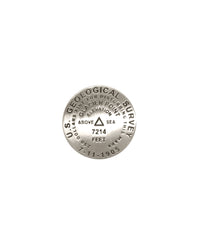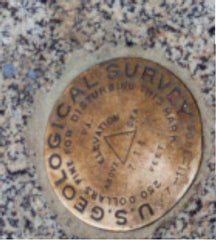- 1 1/4 inch diameter
- Cast in fine pewter
- Strong magnet embedded in back
- Mounted on story card
Place Name: Glacier Point
Elevation: 7,214 ft.
Coordinates: N37° 43' 51'' W119° 34' 29''
Location: Yosemite National Park, California, USA
MarkerSleuth Photo Contributor: John Flippin, 1999
Glacier Point is a popular site within Yosemite Park for tourists and hikers alike. Whether hiking the Four Mile Trail or arriving by motor vehicle, all are rewarded with a spectacular view of Yosemite Falls, Half Dome, El Capitan and major peaks. Sunset and full moon nights are favorite times to visit. "The story of Yosemite began about 500 million years ago when the Sierra Nevada region lay beneath an ancient sea. Thick layers of sediment lay on the sea bed, which eventually was folded and twisted and thrust above sea level. Simultaneously molten rock welled up from deep within the earth and coiled slowly beneath the layers of sediment to form granite. Erosion gradually wore away almost all the overlying rock and exposed the granite. And even as uplifts continued to form the Sierra, water, and then glaciers, went to work to carve the face of Yosemite. Weathering and erosion continue to shape it today." (Source: National Park Service)
Elevation: 7,214 ft.
Coordinates: N37° 43' 51'' W119° 34' 29''
Location: Yosemite National Park, California, USA
MarkerSleuth Photo Contributor: John Flippin, 1999
Glacier Point is a popular site within Yosemite Park for tourists and hikers alike. Whether hiking the Four Mile Trail or arriving by motor vehicle, all are rewarded with a spectacular view of Yosemite Falls, Half Dome, El Capitan and major peaks. Sunset and full moon nights are favorite times to visit. "The story of Yosemite began about 500 million years ago when the Sierra Nevada region lay beneath an ancient sea. Thick layers of sediment lay on the sea bed, which eventually was folded and twisted and thrust above sea level. Simultaneously molten rock welled up from deep within the earth and coiled slowly beneath the layers of sediment to form granite. Erosion gradually wore away almost all the overlying rock and exposed the granite. And even as uplifts continued to form the Sierra, water, and then glaciers, went to work to carve the face of Yosemite. Weathering and erosion continue to shape it today." (Source: National Park Service)




